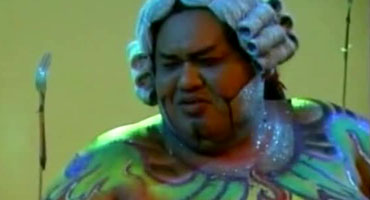
 I agree
I agree
.
Pertaruhan Drupadi [Drupadi at Stake] (2005)
Dalang: Slamet Gundono
How to cite: Slamet Gundono ([2005] 2016), Pertaruhan Drupadi [Drupadi at Stake], translation and notes by Miguel Escobar Varela, Yosephin Novi Marginingrum and Jozina Vander Klok. Singapore: Contemporary Wayang Archive. Retrieved from http://cwa-web.org/en/PertaruhanDrupadi.
Summary
Puntadewa receives an invitation to play dice. His family disagrees but he leaves anyway. He plays against Sengkuni. He wins the first game but ends up losing his freedom, his brothers and his wife, Drupadi. The Korawa want to rape her, but she leaves the world of wayang seeking help. Her journey takes her around the world, until she meets the president of America, George Bush, who refuses to help her. Drupadi asks dalang Slamet Gundono for help, but he can't change the story. He advises her to find her own way. Drupadi leaves Puntadewa and the world of wayang in the middle of the rain, carrying her child Pancawala, and seeking her own destiny.
Story: Mahabharata
Music: Distinctive Fusion
Space: Modified Space, Gedebog
Performers: Actors, Wayang Kulit Puppets, Dalang as Actor
Puppets: Wayang Kulit Puppets, Unconventional Wayang
Language: Javanese
Recording details
Notes: This recording was part of the TV series Jagad Wayang [The Wayang World].
Produced by: Workshop Production Network
Recording place: Studio-19, Surakarta
Addional credits
Music: Salmet Gundono, Sri Widodo
Choreography: Rini Endah Sulistyowati
Supporting players: Rini Endah Sulistyowati, Nuning Rejeki, Retno Wulan Sulanjari, Sri Widodo, Sri Waluyo, Dwi Priyo, Erwan Parlan
Creative advice: Bobby Sandy, H George Kamarullah, Mochammad Rivai, AGS Ariadipayana, Akhlis Suryapati
Production design: Mochammad Rivai
Producer: Asrul Zulmi
Executive producer: Esha Kardus
Production manager: Honggo Utomo
Camera: Iwan Onone, Kris Nyar, Irwanto
Editor: Esha Kardus, Kris Nyar
Image projection: Sartono Indiarto
Lighting: Tutut, Nur "Unyil" Hidayat
Sound: Iwan Onone, Sartono Indiarto
Artistic support: Honggo Utomo, Heru Boim
Costume: Heru Boim, Rini Endah S
Makeup: Gones Luh Indriyani, Yeni Nindiana
Properties: Badrun, Dedek Ferdiansyah
Still photo: Joko Suryono
Production unit: A Yusdi Nugroho, Tarno Bento
All-round support: Lalang Wijanarko, Manggih Raharjo
Catering: Harmony Catering
Marketing: PT Graha Surya Kencana
Law consultants: Ongko Sidharta & Partners
View the metadata record for this resource.
Translation and notes by Miguel Escobar Varela (MEV), Yosephin Novi Marginingrum (YNM) and Jozina Vander Klok (JVK).
1. Abang None Jakarta is a competition where 15 young couples are selected each year to become cultural ambassadors of the city YNM.2. Possibly a joke about the dalang and his wife, as he was away for the shooting of this recording MEV.
3. Kowé is a ngoko [low Javanese] second person pronoun for showing intimacy JVK.
4. Kula mbotěn is a high Javanese form showing politeness and honor towards Puntadewa JVK.
This is possibly the place where they stayed in Bandung for the video shooting MEV.
5. The character says he is seeing his girlfriend at the kost, that is the bording house of either of them JVK.
6. Pacaran means both dating and making out MEV.
7. Ikrak-ikruk are probably wild flowers growing in the courtyard YNM.
8. Fragment in Indonesian MEV.
9. Dĕkhok [to have a dent, hollow] JVK.
10. Dhĕngkok [to sit with bowed head] JVK.
11. Yamadipati is the god that "snatches" souls away when people die MEV.
12. This song, titled Sawan Ka Mahina is part of the soundtrack of the Indian film Milan (1967, dir. Adurthi Subba Rao), sung by Mukesh and Lata Mangeshkar. The melody of the song is similar to the Indonesian dangdut song Sembilan Bahan Pokok by Thomas Djorghi YNM.
13. Sengkuni uses Indonesian except for the subject sampéyan [you] in Madya [Middle Javanese] JVK.
14. Cap dji kia is a lottery where people buy tickets to guess which twelve cards out of an entire deck have been placed inside a wooden box. Kartu lima [five cards] is a poker game MEV.
15. Dingdong [arcade games] MEV.
16. Uthuk-uthuk [betting stakes] YNM.
17. Arjuna uses Krama [High Javanese], showing respect to Prabu Puntadewa JVK.
18. King Puntadewa uses Krama [High Javanese] with Sengkuni, showing he respects and honours him JVK.
19. Narrator uses Indonesian JVK.
20. The pakěm is the list of the wayang rules and traditional story lines, it can be thought of as a canon MEV.
21. Solo refers to the city of Surakarta and Solo Puran means the Temple of Solo. Perhaps the joke is that puran also means "a cut of raw meat" and kothok is a vegetable soup MEV.
22. Pèmèyan [the clothes that have been set up to dry in the sun] MEV.
23. Pos Kamling stands for Pos Keamanan Lingkungan [voluntary neighborhood watchmen] MEV.
24. Saat kuwé [at that time] is not translated since it just indicates past tense JVK.
25. Béndra [frisky, frolicsome] JVK.
26. Sengkuni speaks to Prabu Puntadewa in Indonesian JVK.
27. Now Sengkuni uses the pronoun Panjenegan [you] in Krama Inggil [highest honor in Javanese] towards Puntadewa JVK.
28. This image was not presented earlier JVK.
29. Krupuk is a type of cracker, commonly consumed in Indonesia MEV.
30. Most cities have a south and a north square MEV. Silir is a place in the city of Solo YNM.
31. Krĕntĕg [an arising thought, idea, desire] JVK.
32. Lĕmèk [lining, protective underlayer ] JVK.
33. Sĕpalih uripé [life's other half] MEV.
34. This is the same song played at the end of Jendral Karna MEV.
35. Duryudana speaks to Drupadi in Indonesian, showing distance JVK.
36. Durmagati speaks to Drupadi in Ngoko [Low Javanese], showing his superiority JVK.
37. Dewi Wilutama is one of 99,999 nymphs in heaven. One day she was turned into a winged horse. She helped Bambang Kumbayana to find Arya Sucitra in the Astina Kingdom. Kumbayana and the winged horse then had a child called Aswatama. This story is presented in Cebolang Minggat at 01:01:14 YNM.
38. Wĕk is an onomatopoeic sound for clothes being torn YNM.
39. The Indonesian Tuhan or Javanese Gusti usually refers to a single (Islamic) god whereas the Déwa refers to the Hindu Gods JVK.
40. Wiyasa (also known as Abyasa or Abiyasa) is the author of the Mahabarata MEV.
41. Mbangir [long and tapering] is considered the finest nose shape JVK.
42. Kroyok [to be surrounded and attacked by a throng] JVK.
43. Sĕga Kucing lit. "cat-portion rice" are small packages of rice sold in street stalls MEV.
44. In Javanese, he says Patih Luar Negri [General in Charge of Foreign Countries] MEV.
45. The name is changed for humorous effect MEV.
46. This is a common excuse in Indonesia for being late MEV.
47. Méndring [to give loans with high interest rates] YNM.
48. Slamet Gundono (1966-2014) was the main performer and dalang in this show MEV.
49. Kotak [the wooden box where the wayang puppets are kept when they are not used in the performance] MEV.
50. Wuku [30 day periods in the Javanese calendar] MEV.
51. Kěris [ceremonial dagger] MEV.
52. Témpé and tahu are soy beancurd, sambĕl is a spicy chilli sauce MEV.
53. Matumpa-tumpa [forming many piles] MEV.
54. Pancawala is the name of Drupadi's five sons: Patiwindya, Sutasoma, Srutasena, Stanika and Srutakerti MEV.
The honorifics in the original languages were retained in the subtitles. In Javanese and Indonesian, speakers address their interlocutors with over 40 different honorifics which denote differences in their relative status and level of intimacy.
ID = Indonesian
JW = Javanese
Adik. ID. Younger brother/sister. It is used for addressing younger people, not necessarily one's relatives.
Adinda. ID. Younger sister. More intimate than adik.
Babé. ID/Betawi. Familiar form of father, commonly used in Jakarta.
Bé. ID/Betawi. Short form of Babé, father. Jakartan slang.
Bang. ID. Older brother, short form of abang. If used with non-relatives, it is has the connotation of a slang, and is somewhat equivalent to “man” in English.
Bĕndara. JW. Master.
Bibi. JW/ID. Aunt. A way of addressing/referring to older women.
Bos. ID/JW. An adaptation of the English "boss". Used either to refer to one's superior or to a friend in a joking context, for example, when a person orders others around without realizing he/she is doing so.
Bu. ID/JW. Short form of ibu, mother.
Bung. ID. Similar to bang, but slightly less formal. It might mean "comrade". The political leaders of the independence war are often referred to with this term, for example Sukarno is often referred to as
Bung Karno.
Dara. JW. Short form of bĕndara, master.
Dèn. JW. Sir, master, used to address royalty. Short form of radèn.
Dhé. JW. Short form of pakdhé, uncle.
Dhik. JW. Short form of adhik. Younger brother/sister. It is used for addressing younger people, not necessarily one's relatives.
Éyang. JW. Grandfather.
Dimas. JW. Younger brother.
Gusti. JW. Lord. Used to address superiors and Gods.
Ibu. JW/ID. Mother. Used generically to address women who are older than the speaker.
Kakang. JW. Older brother.
Kakang mbok. JW. Older sister.
Kanda. ID. Older brother. Formal.
Kang. JW. Older brother. Informal.
Kangmas. JW. Older brother.
Kaki. JW. Uncle
Kang. JW. Older brother, used generically for men older than the speaker. It is a shortened version of kangmas).
Kakak. JW/ID. Older brother/sister, used generically for people who are older than the speaker.
Lé. JW. Son, short version of tholé.
Lik. JW. Often used between friends as a slang term of address. Uncle, "little father." Short form of {paklik}.
Ma. JW. Same as pak, short form of rama.
Mbak. JW/ID. Older sister. Used generically for women who are slightly older than the speaker.
Mamang. ID. Uncle.
Mang. ID. Uncle, short form of mamang.
Mas. ID. Older brother, used generically for men who are older than the speaker. Although it is also a shortened version of the Javanese kangmas people prefer to use mas in Indonesian and kang in Javanese.
Mas bro. ID. Slang used among male friends. In a way, it is a reduplication.
Mbah. JW/ID Grandfather, grandmother. It is used generically to address people who are much older than the speaker. Short form of simbah.
Mbok. JW. Mother, short form of simbok. Used generically for women who are older than the speaker.
Mbokdhé. JW. Aunt. Literally, "big mother".
Mbul. JW. Informal term of address between close male friends.
Ndara. JW. Master.
Nduk. JW. Daughter, short form of gĕndhuk.
Nggèr. JW. Son, short form of anggèr Used generically for people who are younger than the speaker, with whom the speaker is on intimate terms.
Nimas. JW. Younger sister.
Nok. JW. West Javanese term for daughter, short form of dhénok.
Nona. ID. Miss, unmarried woman.
Paduka. ID. Your Excellency.
Pak. JW/ID. Father, used generically for men who are older than the speaker.
Pakdhé. JW. Uncle. Used to refer to a man who is older than one's father.
Paman. ID. Uncle. Used to refer to a man who is older than one's father.
Pangéran. JW/ID. Prince.
Prabu. JW. King.
Radén. JW. Master, used for royalty.
Rama. JW. Father. It can also be used to designate catholic priests when one is speaking in Indonesian.
Simbah. JW/ID Grandfather, grandmother. It is used generically to address people who are much older than the speaker.
Sinuwun. JW. Very formal way to address a man, reserved for sultans, kings and Gods.
Siwa. JW. Term for addressing older people.
Siwak. JW. Same as Siwa. Term for addressing older people.
Tholé. JW. Son
Tuan. ID. In colonial contexts, this is the way foreigners are addressed but it can also mean sir.
Wa Nĕrpati. JW. Uncle king, equivalent to the Indonesian paman raja.
Wa. JW. For addressing older people, short form of siwa.
Yayi. JW. Younger brother/sister.
Yunda. JW. Older sister.
See the Translation conventions.
Share:
in the translations or data.
